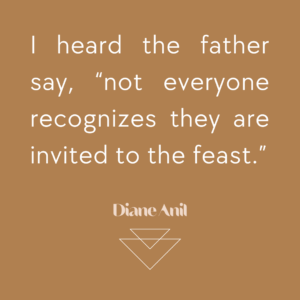
Not everyone recognizes they are invited to the FEAST
The other night, I found myself reflecting on someone I know and love and their current life circumstances. As I sat in that quiet moment, I distinctly heard the Father whisper, “Not everyone recognizes they are invited to the feast.”
As I lingered in His presence, pondering these words, a flood of thoughts began to stir within me—thoughts I feel compelled to share.
It’s easy to look at others’ lives and judge their choices, especially when we see people we care about settling for less than they deserve. It’s tempting to criticize when we know they could be walking in something far more beautiful. Pride often leads us to place ourselves on a pedestal, evaluating the actions of others and condemning their sin and brokenness. Worse still, many will take pleasure in spreading these judgments, whether through direct gossip or subtle whispers. But in doing so, we only perpetuate our own wounds and feed the very brokenness we claim to despise.
Yet, the truth that presses on my heart is this: “Not everyone recognizes they are invited to the feast.” This truth applies not only to those we judge but also to ourselves—the ones doing the judging. What is this feast?
My thoughts led me to dive deep into the seven feasts in the Bible: Passover, the Feast of Unleavened Bread, the Feast of Firstfruits, Pentecost, the Feast of Trumpets, the Day of Atonement, and the Feast of Tabernacles. As I meditated on these sacred celebrations, several truths became clear to me. The feast is open to all, yet not everyone accepts the invitation, and some even violently reject it. Even though the invitation is extended to all, there is still an expectation that we come on God’s terms. These feasts are not mere rituals; they represent a pattern of redemption, a picture of Christ’s fulfillment, a reminder of God’s provision, and a call to worship and holiness.
The Father has prepared a magnificent feast for each of us—a table laden with every good and beautiful thing that reflects His nature. And the best part is that we have full access to it all. Yet, so many of us either don’t know this feast exists or struggle to receive it, trapped in a place of spiritual orphanhood. The root of this struggle is a crisis of identity—an issue of knowing who we are as sons and daughters of the Father.
When we begin to embrace our Beloved Identity, when we truly receive and live as the ecclesia, we will begin to make a profound and transformative impact—not just in the world but within the Church itself. The epidemic of identity crisis that so deeply affects our world can only be healed as we step into the fullness of our identity as children of God.
To expect those who have never experienced God as ABBA to live in the fullness of His love and goodness is mere foolishness. The bar for our lives can only be raised when we come to know Him as a good Father who desires good for us—and when we believe we are worthy of His goodness. Our expectancy grows in proportion to our relationship with Him. The way we value ourselves is deeply shaped by the narratives we have believed since childhood and the relationships we continue to entertain. If those narratives have not been father-filtered—challenging the lies we believe in exchange for truth—we will continue to settle for less.
We are invited to the feast. Will we come? Will we embrace all that the Father has prepared for us? Do we truly know who we are and what we’re worth? Are we willing to challenge the lies we’ve believed and exchange them for the truth of who God says we are? What will it take for us to stop settling for scraps and sit at the table of abundance He has set before us? The invitation is there, but will we recognize it? Will we receive it?
Psalm 34:8 (NIV) “Taste and see that the Lord is good; blessed is the one who takes refuge in him.” This verse invites us to “taste” the goodness of God, suggesting that experiencing His presence is like feasting on something deeply satisfying and life-giving.
Isaiah 55:1-2 (NIV) “Come, all you who are thirsty, come to the waters; and you who have no money, come, buy and eat! Come, buy wine and milk without money and without cost. Why spend money on what is not bread, and your labor on what does not satisfy? Listen, listen to me, and eat what is good, and you will delight in the richest of fare.” This passage invites people to feast on the abundance of God’s provision, suggesting that God’s presence and the blessings He offers are more satisfying than anything else.
John 6:35 (NIV) “Then Jesus declared, ‘I am the bread of life. Whoever comes to me will never go hungry, and whoever believes in me will never be thirsty.’” Jesus speaks of Himself as the Bread of Life, implying that feasting on Him, or coming into His presence, is the ultimate spiritual sustenance that satisfies our deepest hunger and thirst.
Revelation 3:20 (NIV) “Here I am! I stand at the door and knock. If anyone hears my voice and opens the door, I will come in and eat with that person, and they with me.” This verse speaks of intimate fellowship with Jesus, where the “eating” or “feasting” represents a deep communion with His presence.


